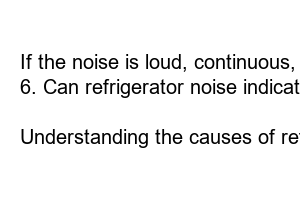냉장고 소음 원인
Title: What’s That Hum? Understanding the Causes of Refrigerator Noise
Introduction:
Having a refrigerator is undoubtedly convenient, but the constant noise it emits can sometimes be a nuisance. However, understanding the causes of refrigerator noise can help you determine if your appliance needs attention or if it’s operating normally. In this blog post, we will explore the common reasons behind those strange sounds your fridge makes, allowing you to make informed decisions for optimal refrigerator performance.
1. Compressor Vibrations:
The refrigerator’s compressor is responsible for circulating the refrigerant, and vibrations from its operation can result in noise. While some level of vibration is normal, excessive noise could indicate a fault or loose components that need securing.
2. Condenser Fan:
The condenser fan, located near the compressor, contributes to cooling the appliance’s coils. If it becomes dirty or damaged, it may produce a grinding or rattling noise. Regular cleaning and maintenance can help mitigate this issue.
3. Evaporator Fan:
Situated in the freezer, the evaporator fan ensures proper airflow for even cooling throughout the refrigerator. Over time, it may accumulate frost, causing it to spin unevenly and generate noise. Defrosting your fridge regularly can prevent this.
4. Faulty Motor:
A malfunctioning motor can lead to various sounds like grinding, humming, or squealing. If your refrigerator is making unusual noises, it’s possible that the motor is experiencing issues that require professional attention.
5. Ice Maker:
The ice maker adds convenience to our lives, but it can also be a source of noise. From buzzing and clunking to thumping sounds, the ice maker’s mechanisms may need adjustment or lubrication to minimize noise.
6. Water Valve:
If your refrigerator has a water dispenser and you notice noise when it’s being used, the water valve could be causing the sound. This valve controls water flow and may generate a loud humming noise when it’s damaged or worn out.
FAQs:
1. Why is my refrigerator making a ticking noise?
A ticking noise could be an indication of a faulty compressor or a failing electrical component. It’s advised to contact a professional for diagnosis and repairs.
2. How can I reduce refrigerator noise?
Regular maintenance, such as cleaning coils and fans, can help minimize noise. Additionally, placing rubber pads or anti-vibration mats beneath the fridge can absorb vibrations.
3. Is a humming noise normal?
A slight humming noise is usually normal since it indicates that the compressor is functioning. However, if the noise becomes loud or irregular, it’s worth investigating the cause.
4. Why is my refrigerator louder at night?
At night, ambient noise levels are generally lower, making any appliance noise more noticeable. Additionally, changes in temperature and pressure within the refrigerator can intensify certain sounds.
5. When should I seek professional help for refrigerator noise?
If the noise is loud, continuous, or accompanied by other issues like temperature fluctuations, it’s advisable to contact a professional technician to diagnose and resolve the problem.
6. Can refrigerator noise indicate a serious problem?
While some noises are completely normal, others can be symptomatic of underlying issues. Ignoring strange sounds may lead to more significant problems and potentially costly repairs, so it’s best to address them promptly.
Summary:
Understanding the causes of refrigerator noise empowers you to take appropriate measures to address any issues and maintain optimal performance. From compressor vibrations to faulty motors, each noise may indicate a different problem. Regular maintenance, timely repairs, and professional assistance can help keep your refrigerator running smoothly and quietly.

